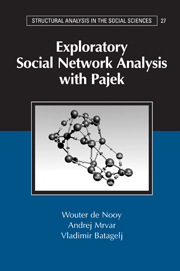Book contents
- Frontmatter
- Contents
- List of Illustrations
- List of Tables
- Preface
- Part I Fundamentals
- Part II Cohesion
- 3 Cohesive Subgroups
- 4 Sentiments and Friendship
- 5 Affiliations
- Part III Brokerage
- Part IV Ranking
- Part V Roles
- Appendix 1 Getting Started with Pajek
- Appendix 2 Exporting Visualizations
- Appendix 3 Shortcut Key Combinations
- Glossary
- Index of Pajek Commands
- Subject Index
5 - Affiliations
Published online by Cambridge University Press: 05 June 2012
- Frontmatter
- Contents
- List of Illustrations
- List of Tables
- Preface
- Part I Fundamentals
- Part II Cohesion
- 3 Cohesive Subgroups
- 4 Sentiments and Friendship
- 5 Affiliations
- Part III Brokerage
- Part IV Ranking
- Part V Roles
- Appendix 1 Getting Started with Pajek
- Appendix 2 Exporting Visualizations
- Appendix 3 Shortcut Key Combinations
- Glossary
- Index of Pajek Commands
- Subject Index
Summary
Introduction
Membership of an organization or participation in an event is a source of social ties. In organizations and events, people gather because they have similar tasks or interests and they are likely to interact. Members of a sports club, for instance, share a preference for a particular sport and play with or against one another. Directors and commissioners on the boards of a corporation are collectively responsible for its financial success and meet regularly to discuss business matters. Inspired by the sociology of Georg Simmel, groups of people that gather around one or more organizations and events are called social circles.
In previous chapters, we studied direct ties among people, such as the choice of friends, or among other social entities, for instance, trade relations between countries. Note that we studied relations among actors of one kind: relations between people or between organizations, but not between people and organizations. Now, we focus on the latter type, which is called an affiliation. Data on affiliations can be obtained relatively easily and they are very popular in data mining.
Affiliations are often institutional or “structural,” that is, forced by circumstances. They are less personal and result from private choices to a lesser degree than sentiments and friendship. Of course, membership in a sports team depends much more on a person's preferences than detention in a particular prison ward, but even the composition of sports teams depends on circumstances and on decisions made by coaches and sports club authorities.
- Type
- Chapter
- Information
- Exploratory Social Network Analysis with Pajek , pp. 101 - 120Publisher: Cambridge University PressPrint publication year: 2005

